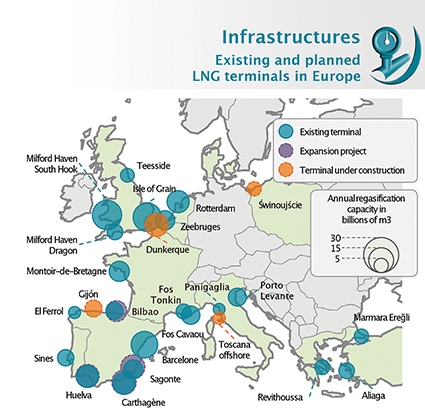How Europe Will Support Russian Competitors on the Gas Market
Russia's strengthened position on the European energy market is raising serious concerns among Western colleagues overseas. The Atlantic Council, a traditional platform for the exchange of opinions of military and international leaders, has issued a report showing forward movement in the idea of Europe's withdrawal from Russian gas and transition to Azerbaijani. Which means Europe is going to remove itself from the Russian gas needle.
The Atlantic Council’s report promotes the need for Europe to support an alternative pipeline from Azerbaijan to Europe via Georgia - the Southern Gas Corridor, in order to "weaken Europe's dependence on Russian gas," and in fact redistribute financial flows to other destinations. Europe's interest in this context is to create a full-fledged competitor of Russia in the gas market by weakening Russia's position through "convenient" agreements with "non-Russian suppliers." No less interesting is the author of the report, Bad Kut, who recently resigned from the CIA where he worked as an energy analyst. Among other things, he also advised American politicians on energy markets.
As a guide to action, the Atlantic Council proposes the provision of favorable conditions for "non-Russian gas suppliers", which should help in the competition with Russia. Interstate agreements and agreements between supplier and recipient countries can be a key instrument for creating those favorable conditions. It is further expected to enter into profitable supply contracts. To provide competitive advantages for "non-Russian suppliers" it is proposed to involve international financial institutions. A year ago, Azerbaijan requested $5 billion for a pipeline project from the World Bank and the European Bank for Reconstruction and Development.
Another proposal of the Atlantic Council is the creation of gas infrastructure which includes the organization of transportation and processing of gas. In Europe, redistribution of the received Russian gas between the European countries through the "addition" of pipelines in Central and Southern Europe to the Russian gas pipelines is already planned. This will allow gas "to move in all directions" in Europe.
The expansion of the Bulgarian gas pipeline system and the creation of new pipeline connections between Bulgaria and Turkey, Greece, Serbia and Romania, as well as the expansion of the Romanian gas transportation network towards Hungary, are envisaged to expand the domestic gas system of Europe. In the north of Central Europe, it is currently planned to build new gas pipelines from Poland to Lithuania, Slovakia and the Czech Republic, and between Austria and the Czech Republic.
A very important role in the redistribution of gas flows is played by LNG (Liquefied Natural Gas) terminals, into which gas will be pumped for further distribution throughout Europe. New terminals for LNG are expected to be established in the Thrace region in Greece and on the island of Krk in Croatia. In connection with this, connecting pipelines are to be built to transport gas from Krk eastwards to Serbia, Bosnia and Hungary. The redistribution of gas flows is planned in Western Europe via the Midcat gas pipeline between Spain and France. This will transport gas from the LNG terminals on the coast of Iberia through France to Central Europe.
The goal of this broad plan is the liberation of parts of the European gas market from isolation. Further expansion of the gas infrastructure will enable other external suppliers, including the USA, to find new routes for gas distribution.
The report also lobbies the creation of the North-South corridor, which will use a new bidirectional gas pipeline from Poland to Croatia that connects the LNG terminals in Swinoujscie and on Krk. The corridor will connect with existing and planned pipelines that will unite it with national networks throughout Central and South-Eastern Europe. It is planned to supply gas to Ukraine via the North-South gas pipeline from Poland, with supplies there planned to increase to eight billion cubic meters per year. “This project primarily benefits suppliers of liquefied gas,” President of Poland Andrzej Duda announced, himself an ardent opponent of Nord Stream-2.
With new introductions into the European energy market, Turkey's position may not be on the side of Russia at all. With the Southern Gas Corridor, Ankara can create an infrastructure independent from Russia. In addition, it is well-known that Turkey wants to become a center for the distribution of gas flows to Europe, allowing Ankara to directly influence the European market.
Director of the Center for Political Conjuncture, Dmitry Abzalov, believes that Washington will rather support the expansion of the network of gas terminals in Europe than the Southern Gas Corridor. Against the background of the fall in energy prices, the Southern Gas Corridor does not present as particularly profitable. Further, the implementation of this project relies on a resource base from which to "reinforce" this gas. Azerbaijani gas is one option, an idea which was supported by Europe, but it is extremely difficult to pump the entire South outline. It is much easier to do what Washington does now: create a LNG terminal system and deliver gas through the US. This is also economically impractical, but for the US it at least means supporting its producers. Such plans suggest the maximum desire of Washington that the European Union create a system of LNG terminals throughout Europe.
Dimitri Dolaberidze











